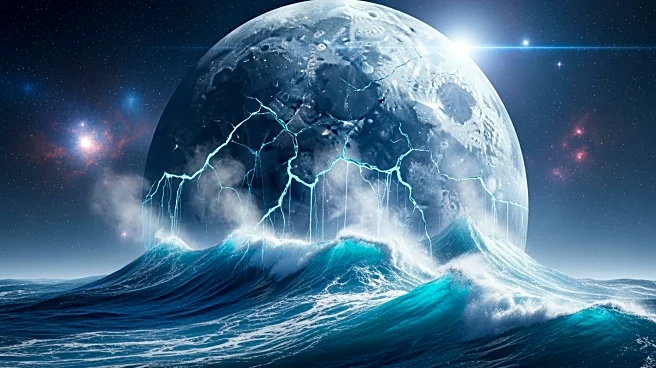What's Happening?
A recent study published by Nature Astronomy explores the possibility that oceans beneath the icy surfaces of moons in the outer Solar System could boil due to shrinking interiors. These moons, such as Enceladus, have surface features indicating complex
geology and the presence of subsurface oceans. The study suggests that gravitational interactions, which cause flexing and friction, generate enough heat to melt the moon's interior. However, these interactions are not constant and can be cyclical, leading to periodic melting and refreezing of the moon's interior. The study highlights that the difference in density between liquid water and ice could result in the moon's interior shrinking as it melts, creating low-pressure areas beneath the ice shell. If the moon is small enough, this low pressure could cause the ocean surface to boil.
Why It's Important?
The findings of this study have significant implications for our understanding of the geological dynamics of icy moons and their potential to host life. The cyclical nature of gravitational interactions and the resulting changes in the moon's interior could affect the stability and longevity of subsurface oceans. This research provides insights into the complex interactions within moon systems and their potential to support life, as the presence of liquid water is a key factor in astrobiology. Understanding these processes could also inform future missions to explore these moons and assess their habitability.
What's Next?
Future research may focus on modeling the specific conditions under which these boiling events could occur and their frequency. Space missions targeting icy moons, such as NASA's Europa Clipper, could provide more data to refine these models and improve our understanding of subsurface ocean dynamics. Additionally, scientists may explore the implications of these findings for the search for extraterrestrial life, considering how these dynamic environments could affect the potential for life to develop and sustain itself.
Beyond the Headlines
The study raises questions about the long-term geological evolution of icy moons and their ability to maintain stable environments conducive to life. The potential for periodic boiling events could impact the chemical composition of the oceans and the types of life forms that could exist there. This research also highlights the importance of considering the dynamic nature of celestial bodies when assessing their habitability, as static models may not fully capture the complexity of these environments.
















